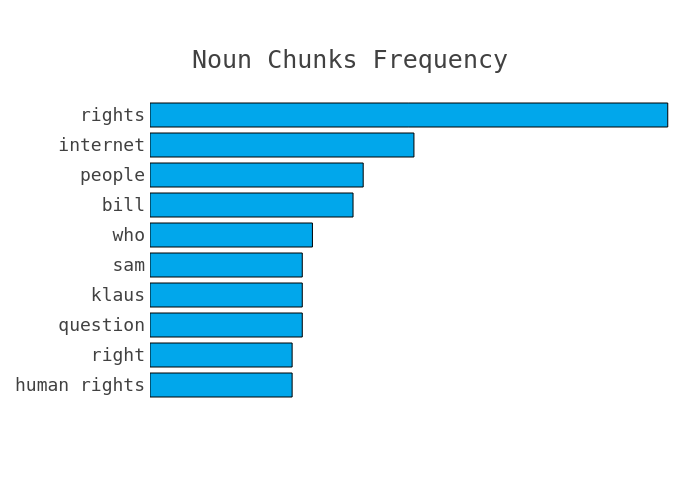A common ‘Bill of digital human rights and responsibilities’
10 Dec 2021 11:00h - 12:00h
Event report
Digital technologies make the world truly global, requiring fundamental and universal human values which transcend all differences. They require common principles and values which would describe and preserve our digital, as well as literal dignity under the ever changing circumstances.The goal of the workshop was to explore the role and function of a digital Bill of Rights, which is guided by fundamental universal human values transcending our differences. Common principles and values are typically expressed as charters, or bills of rights. They provide a framework for emerging governance and governance mechanisms. At the current stage of internet governance, this process is in its infancy or, arguably, has not yet started, at all. The rights of engagement, along with the rights and responsibilities of our digital residency as digital citizens remain unclear. The session described the role and function of the digital Bill of Rights and looked into the role of digital rights in the past, the present, and toward the future.
We exist in a duality of the real world and cyberspace. As such, we are not only citizens of our countries but have also become citizens of cyberspace. That, naturally, creates tensions, because we are torn by the increasing impact of digital technologies and the lack of control over them, stated Mr Klaus Stoll (co-founder and CEO of the Internet Integrity Taskforce, IITF). Digital governance is dominated more by special interests than by the common good, and it comes down to who can exert most of the power. Effective governance, whether national or global, has a profound effect on ourselves because we do not know how to exercise our rights. In Stoll’s opinion, the missing link is a construct of the digital Bill of Rights. We need to restore the missing trust. The digital Bill of Rights will shift the viewpoint of the current internet discussion away from the limited interest groups, toward a common human rights interest. In that manner, trust becomes the foundation of economic, social stability, and development in cyberspace. Stoll added that we should fear machines becoming better than people. The underlying issue is not one of engineering. The main problem is figuring out how to create algorithm routines which follow defined human rights and the digital Bill of Rights.
Digital rights are poorly protected and a poor understanding and notion of responsibilities prevails. There is low integrity in our governance, business, and societal entities. Integrity and trust are necessary for successful outcomes. Digital citizenship is required for this. It’s critical to realize that the obligations do not imply subservience to the government. They present mutual respect for mutual rights. Digital Colonialism is taking place in some of the large businesses. Data is being served in exchange for social media access along with being peppered with ads to buy things. On a personal level, we’re in digital servitude, trying to acquire digital rights. ‘Digital servitude and digital exploitation today. Digital citizenship and democracy tomorrow,’ stated Mr Sam Lanfranco (Professor Emeritus and Senior scholar at York University) who also added that we need broad stakeholder engagement and dialogue to build a global charter of digital rights and responsibilities, as a multilateral, multistakeholder project. Along with the national bills to enshrine digital citizenship at the national level. What is necessary is addressing systemic issues through principles, not just the symptomatic problems singularly. He underlined the importance of stakeholder education in this process.
Ms Bruna Santos (the German Chancellor at the Alexander van Humboldt Organisation), spoke about the set of principles for internet governance in Brazil and the construction of legislations such as the Data Protection Bill. The compromise of the principal actors who were behind them was the crucial aspect of the process. That was one of the two key procedures which allowed politicians, the private sector, and anyone else wishing to participate to sit at the same table on an equal footing. And, as a result of the process, the civil society and many other sectors in Brazil have been educated on the subject.
Mr Brian Beckham (Head ofInternet Dispute Resolution Section at World Intellectual Property Organisation (WIPO)), noted that much of the focus has so far been on what is done with personal data online. It is really difficult to know who you’re transacting with. One of the issues is if there’s a way to address this tension between anonymity for private use and information about vendors for commercial and public uses.
New technologies have huge potential benefits but also the potential to be destructive, as well. if not developed and used properly. We’ve already seen examples of human rights violations that are linked to the AI. For example, the AI has been employed by governments to identify protesters through facial recognition. Furthermore, Ms Stacey King (policy fellow at Oxford Internet Institute), stated that this does not mean we should prevent development and the use of new technologies, but rather proceed in a manner that is guided by the pillars of peace – development and human rights. What we need is collaboration of all the groups involved, especially those with the fundamental understanding of those technologies. Otherwise, we will not be able to deal with pressing issues.
By Boris Begovic
Session in numbers and graphs




Automated summary
Diplo’s AI Lab experiments with automated summaries generated from the IGF sessions. They will complement our traditional reporting. Please let us know if you would like to learn more about this experiment at ai@diplomacy.edu. The automated summary of this session can be found at this link.Related event

Internet Governance Forum (IGF) 2021
6 Dec 2021 10:00h - 10 Dec 2021 18:00h
Katowice, Poland and Online
